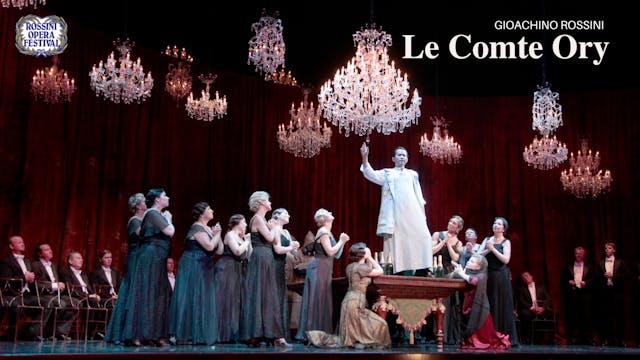La Scala di Seta - Rossini Opera Festival 2009
Rossini Opera Festival
•
1h 44m
In this colorful and exuberant production by Damiano Michieletto, the comical farce becomes an Almodóvaresque spectacle that "transforms all the singers into extraordinary actors" (La Stampa). Rossini's one-act opera weaves a burlesque tale of secret husbands and would-be lovers where general hilarity ensues before all ends happily. The production of La Scala di Seta (The Silken Ladder) from the Rossini Opera Festival Pesaro dives head first into the romantic chaos with Olga Peretyatko as the cunning young wife Giulia. comical genius José Manuel Zapata as her secret husband Dorvil, Anna Malavasi as Giulia's cousin in love with Blansac and Carlo Lepore as Blansac, the hapless suitor.
Composer: Gioachino Rossini
Conductor: Claudio Scimone
Venue: Rossini Opera Festival
Orchestra: Orchestra di Bolzano e Trento
Cast/Soloist: Daniele Zanfardino, Olga Peretyatko, José Manuel Zapata, Carlo Lepore, Anna Malavasi, Paolo Bordogna
Genre: Opera
Up Next in Rossini Opera Festival
-
Adelaide di Borgogna - Rossini Opera ...
Set in medieval Italy, Rossini’s rarely performed Adelaide di Borgogna (Adelaide of Burgundy) first produced in 1817 at the Teatro Argentina, Roma is based on dramatic historical events that led to Otto the Great (Ottone) of Germany conquering the Kingdom of Italy. Despite its political and warli...
-
Zelmira - Rossini Opera Festival 2009
Celebrated tenor Juan Diego Flórez stars in the first production of Rossini's Zelmira on film - a rarely performed opera regarded as one of Rossini's most musically complex works. Flórez is joined by a dazzling cast, headed by Kate Aldrich in the title role, Gregory Kunde (Antenore) and Alex Espo...
-
Le Comte Ory - Rossini Opera Festival...
Written in French in 1828 for the Paris Opéra, Le Comte Ory has maintained its popularity and success to this day. Re-using some of the music from his Viaggio a Reims, Rossini turns the disguise-based libretto into a spirited play of erotic lightness by creating what one critic called “the most i...



